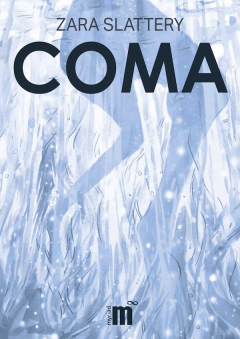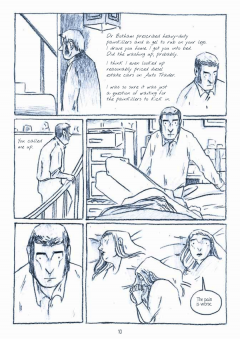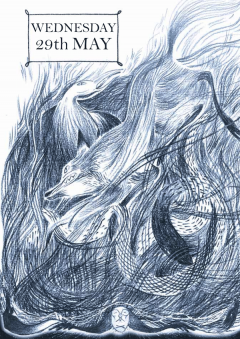Review: Coma (Myriad Editions)
Imagine being stuck in your own body, powerless to control anything happening around you, including the suffering of your family as they watch you deteriorate. In 2013, this actually happened to Zara Slattery, and in her autobiographical graphic novel ‘Coma’, she details how she, and her husband Dan, deal with this traumatic event.
 Publisher: Myriad Editions
Publisher: Myriad Editions
Writer: Zara Slattery
Artist: Zara Slattery
Price: Pre-order for £18.99 here!
Zara Slattery’s Coma focuses on the dual narratives of a husband and wife, after the latter’s sudden and unforeseen descent into a coma. Told from both perspectives, we see Dan struggle with family life whilst watching his wife’s debilitating condition, as Zara simultaneously struggles with feeling trapped in her own body and having terrifying hallucinations.
Coma begins with a foreword describing the ordinary lives of the husband-and-wife duo and their three children. Zara is having some issues with a sore throat, but neither of them think it is a big deal. Within a week, the unthinkable has happened: Zara’s ‘sore throat’ has resulted in a coma, and Dan is told to prepare for her possible death. This is where our story begins, at the start of Dan’s turmoil and Zara’s experience with ‘altered reality’ whilst stuck inside her body.
 Slattery manages to differentiate the perspectives of the couples not just artistically, but tonally. Dan’s diary-entry narrative is mostly factual and less emotive, with lighter blue line-illustrations and white backgrounds. Both represent his more factual and stoic outlook towards the situation. Zara’s hallucinogenic nightmare is tonally more poetic and emotional and features much darker blue illustrations. These transform into larger-than-life colour illustrations as Zara’s delirium continues, and she accepts her locked-in syndrome as her reality: the longer she remains in her coma, the more realistically Slattery paints her terrifying visions.
Slattery manages to differentiate the perspectives of the couples not just artistically, but tonally. Dan’s diary-entry narrative is mostly factual and less emotive, with lighter blue line-illustrations and white backgrounds. Both represent his more factual and stoic outlook towards the situation. Zara’s hallucinogenic nightmare is tonally more poetic and emotional and features much darker blue illustrations. These transform into larger-than-life colour illustrations as Zara’s delirium continues, and she accepts her locked-in syndrome as her reality: the longer she remains in her coma, the more realistically Slattery paints her terrifying visions.
With such a serious theme at its core, Coma can get quite dark. Zara’s condition doesn’t have a magical quick fix: for the reader, it is exacerbating to see Zara struggle in her prison-like body, as doors representing her freedom keep closing on her. She experiences awful hallucinatory sequences leading to paranoia and self-loathing as voices declare her ‘guilty’ for various horrific crimes. The heart-breaking moments aren’t limited to Zara’s narrative, however, and from Dan’s perspective we watch her family adapt to the circumstances – our hearts felt heavy when Zara’s children came to see her, and she couldn’t comfort them while they were crying.
 The more outlandish Zara scenes focus on allusions and metaphors: Zara calls her coma ‘purgatory’ alluding to herself as Dante, seemingly stating that she needs guidance through the metaphorical nightmare that she is trapped in, much like the bewildered Virgil in Dante’s classic The Divine Comedy. The art also takes on a more metaphorical feel and includes strange optical illusions of animal figures amidst the chapter dividers, who seem to grow more sinister as Zara’s condition debilitates. Animal instincts are a huge theme throughout Coma, as Zara finds herself transforming into different predators to deal with her feelings of guilt, loneliness and fear: she appears as a bird and rabbit to try and fly/bounce her way out of her delirium to her family, as a kind of water horse to protect herself from threatening shadows, and as a wild dog when she feels her family are being targeted.
The more outlandish Zara scenes focus on allusions and metaphors: Zara calls her coma ‘purgatory’ alluding to herself as Dante, seemingly stating that she needs guidance through the metaphorical nightmare that she is trapped in, much like the bewildered Virgil in Dante’s classic The Divine Comedy. The art also takes on a more metaphorical feel and includes strange optical illusions of animal figures amidst the chapter dividers, who seem to grow more sinister as Zara’s condition debilitates. Animal instincts are a huge theme throughout Coma, as Zara finds herself transforming into different predators to deal with her feelings of guilt, loneliness and fear: she appears as a bird and rabbit to try and fly/bounce her way out of her delirium to her family, as a kind of water horse to protect herself from threatening shadows, and as a wild dog when she feels her family are being targeted.
While the book focuses on a very serious subject, the innocence and naivety of Zara’s young children, Tilda, Tamblyn and Ted, bring stand-out moments of happiness, despite not being the main focus. Not only do they have impeccable taste (Club Penguin and My Neighbour Totoro? Yes please!), but they adapt to their circumstances, and try to live their lives to the fullest (‘pin the moustache on the puffle’ is inspired and should be a staple kid’s party game in our opinion!). Other moments of joy include Zara’s husband detailing how they fell in love, and the wonderful support throughout that Zara’s family experiences through their seemingly endless swarm of helpful family and friends.
This is definitely a quiet, understated read. While it’s not hugely plot driven or action packed, Slattery’s refreshing honesty about her experience is truly inspiring, and the slow-burn format packs a real emotional punch.



October 9, 2025 @ 1:32 am
Excellent breakdown of the topic. Stay with dubai racing horse — Meydan’s live races. low‑latency HD streaming. highlights and replays, post‑race interviews, track conditions. clear commentary and analysis.
January 22, 2026 @ 12:32 pm
Thanks for sharing. I read many of your blog posts, cool, your blog is very good. https://www.binance.com/en/register?ref=JHQQKNKN
February 3, 2026 @ 9:23 am
https://askoff.ru
February 3, 2026 @ 1:16 pm
https://asklong.ru
February 4, 2026 @ 5:45 am
track internet usage mac https://otvetnow.ru electrician online courses